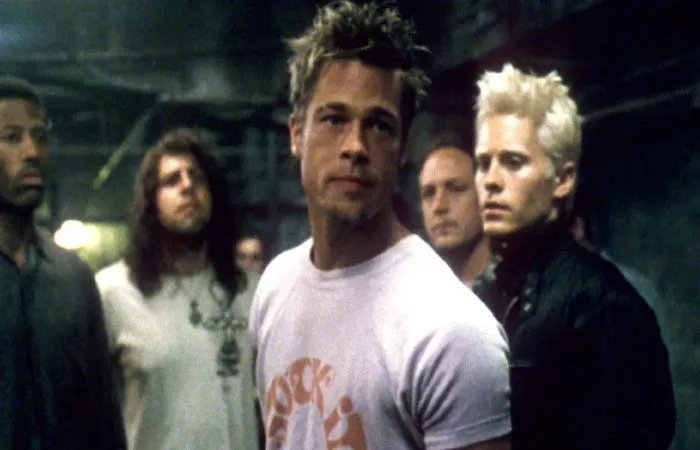Chuck Palahniuk’s novel “Fight Club” and its film adaptation by David Fincher delve deep into provocative themes of masculinity, identity, consumerism, and societal rebellion. Both versions of “Fight Club” challenge conventional norms and invite viewers to confront uncomfortable truths about modern existence. In this analysis, we explore the main points of “Fight Club” and their enduring relevance.
1. Alienation and Disillusionment
“Fight Club” portrays a protagonist (referred to as the narrator) who is disillusioned with his mundane life and trapped in a cycle of consumerism and corporate monotony. The narrator’s sense of alienation is palpable as he attends support groups for illnesses he doesn’t have, seeking solace in fabricated suffering. His existential crisis reflects broader societal anxieties about the emptiness of materialism and the pursuit of authentic purpose.
2. Toxic Masculinity and Identity Crisis
At the heart of “Fight Club” is a critique of toxic masculinity and the societal pressures that shape male identity. The narrator’s encounter with Tyler Durden—a charismatic and anarchistic soap salesman—leads to the formation of an underground fight club, where men seek catharsis through physical violence. The film explores themes of aggression, dominance, and the destructive consequences of repressed emotions.
Tyler Durden becomes an emblem of unrestrained masculinity, challenging societal norms and encouraging rebellion against emasculating consumer culture. Through their shared experiences in fight club, the narrator confronts his own crisis of identity and grapples with conflicting desires for self-actualization.
3. Consumerism and Rebellion
“Fight Club” is a scathing critique of consumerism and the dehumanizing effects of modern capitalism. Tyler Durden’s anti-consumerist manifesto resonates with disaffected viewers seeking meaning beyond material wealth. The film exposes the absurdity of societal expectations and encourages viewers to question the value of possessions and superficial fulfillment.
The formation of fight club represents a collective act of rebellion against the soul-crushing monotony of corporate life. Participants in fight club seek liberation from societal constraints and forge authentic connections through physical confrontation, challenging the status quo and asserting their agency in a conformist world.
4. Identity and Self-Destruction
Central to “Fight Club” is the theme of identity and self-discovery. The narrator’s fractured psyche and unreliable narration underscore a deeper exploration of personal identity and existential angst. As the film unfolds, the narrator’s relationship with Tyler Durden blurs the boundaries between reality and illusion, leading to a profound psychological transformation.
The film’s twist ending invites viewers to contemplate the narrator’s ultimate realization and the consequences of self-deception. “Fight Club” raises questions about the authenticity of personal identity and the pursuit of self-actualization amidst societal pressures.
5. Existential Angst and Freedom
Ultimately, “Fight Club” grapples with existential themes of angst and freedom. The characters’ quest for meaning and authenticity reflects broader societal anxieties about individualism and societal conformity. Tyler Durden embodies a desire for liberation from societal constraints, advocating for radical acts of rebellion and self-expression.
The film’s enigmatic conclusion challenges viewers to confront uncomfortable truths about the complexities of human nature and the pursuit of personal agency. “Fight Club” invites introspection into the nature of existence and the transformative power of individual rebellion.
Conclusion: Cultural Impact and Legacy
“Fight Club” continues to resonate with audiences as a provocative and thought-provoking exploration of contemporary anxieties and societal alienation. Both the novel and the film adaptation challenge conventional narratives and provoke discourse about masculinity, identity, and rebellion.
Chuck Palahniuk’s incisive prose and David Fincher’s visionary direction create a cinematic experience that lingers in the mind long after the credits roll. “Fight Club” stands as a testament to the power of storytelling to challenge perceptions and inspire critical reflection about the complexities of modern life. Whether celebrated as a cult classic or critiqued for its controversial themes, “Fight Club” remains a seminal work that invites viewers to confront the uncomfortable truths of societal disillusionment and the quest for individual freedom.
Related Topics:
Film Review: “Fight Club” (1999)

